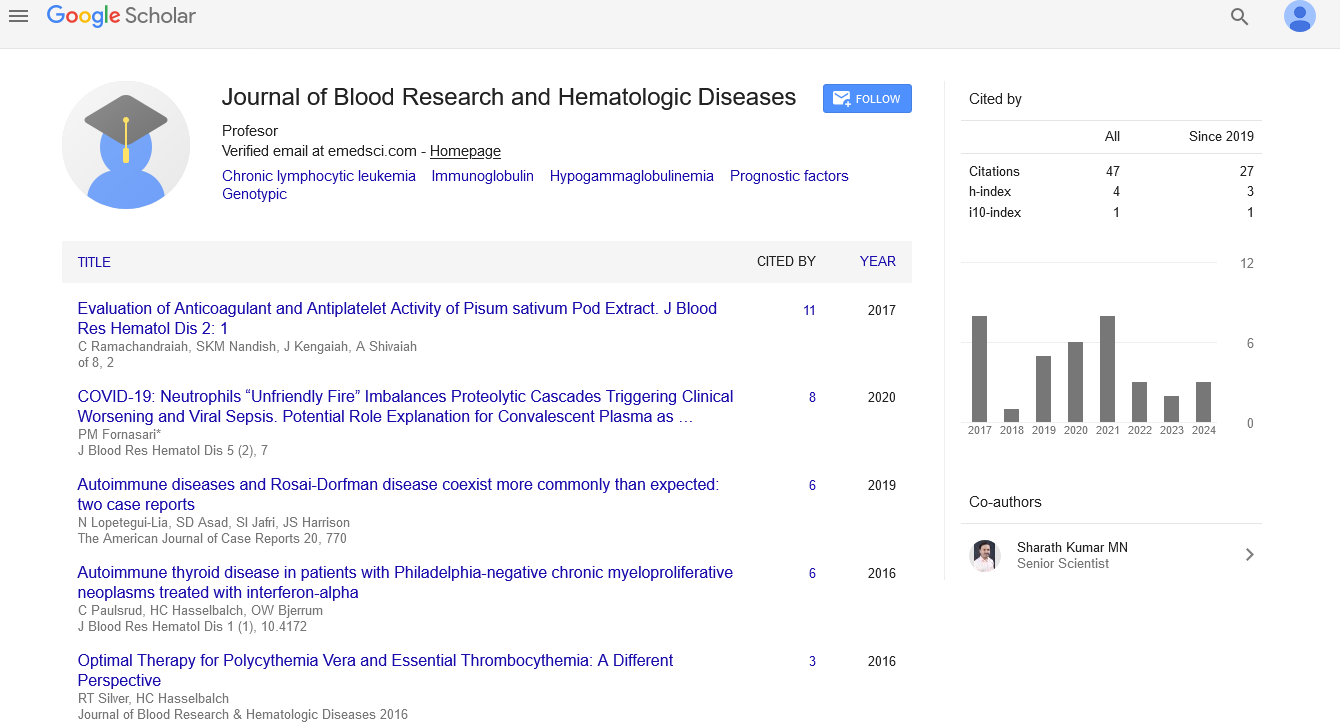Commentary, J Blood Res Hematol Dis Vol: 8 Issue: 3
Hematopoiesis in Health and Disease: A Comprehensive Overview
Mia Schmidt*
1Department of Biology, University of Naples Federico II, Naples, Italy
*Corresponding Author: Mia Sc hmidt,
Department of Biology, University of
Naples Federico II, Naples, Italy
E-mail: mia.schmidt3@unf.it
Received date: 28 August, 2023, Manuscript No. JBRHD-23-115308;
Editor assigned date: 30 August, 2023, PreQC No. JBRHD-23-115308 (PQ);
Reviewed date: 13 September, 2023, QC No. JBRHD-23-115308;
Revised date: 21 September, 2023, Manuscript No. JBRHD-23-115308 (R);
Published date: 29 September, 2023, DOI: 10.4172/jbrhd.1000179
Citation: Schmidt M (2023) Hematopoiesis in Health and Disease: A Comprehensive Overview. J Blood Res Hematol Dis 8:3.
Description
Hematopoiesis, the process of blood cell formation, is a fundamental biological phenomenon vital for maintaining health and vitality. This intricate process occurs in the bone marrow and involves the differentiation and maturation of stem cells into various blood cell types, including Red Blood Cells (RBCs), White Blood Cells (WBCs), and platelets. Hematopoiesis plays a pivotal role in maintaining homeostasis, and its dysregulation can lead to a wide range of diseases.
Hematopoiesis in Health
In a healthy individual, hematopoiesis is a finely regulated and dynamic process that ensures a constant supply of blood cells to meet the body's needs. This process involves a hierarchy of cells, with Hematopoietic Stem Cells (HSCs) at the apex. These multipotent stem cells can give rise to all blood cell lineages, making them the foundation of hematopoiesis.
Multipotent stem cells: HSCs have the remarkable ability to selfrenew and differentiate into more specialized progenitor cells.
Progenitor cells: Progenitor cells are intermediate stages in hematopoiesis. They are committed to specific lineages but still maintain some degree of flexibility.
Differentiation: Progenitor cells differentiate into various blood cell types, including erythrocytes (RBCs), leukocytes (WBCs), and megakaryocytes (precursors of platelets).
Regulation: Hematopoiesis is tightly regulated by a complex network of cytokines and growth factors that control the proliferation, differentiation, and mobilization of blood cell precursors.
Hematopoiesis in disease
Disruptions in hematopoiesis can lead to various hematological disorders and diseases. Here are some common examples:
Anemia: Anemia is a condition characterized by a deficiency of RBCs or a decreased ability of RBCs to carry oxygen. This can result from impaired production of RBCs, excessive destruction, or a combination of both.
Leukemia: Leukemia is a group of blood cancers that originate in the bone marrow. It involves the uncontrolled proliferation of abnormal WBCs, which can interfere with the production of normal blood cells.
Thrombocytopenia: Thrombocytopenia is a disorder marked by a reduced platelet count, leading to a higher risk of bleeding and bruising. It can result from decreased platelet production or increased platelet destruction.
Myelo-Dysplastic Syndromes (MDS): MDS is a group of disorders characterized by dysfunctional hematopoiesis, leading to the production of abnormal blood cells. These conditions can progress to acute leukemia.
Aplastic anemia: Aplastic anemia is a rare disorder in which the bone marrow fails to produce enough blood cells. This can be congenital or acquired and may be caused by factors like radiation, chemicals, or infections.
Polycythemia Vera: Polycythemia vera is a rare blood cancer that causes an overproduction of RBCs, leading to an increased risk of clotting.
Future Prospects
The future of hematopoiesis study and therapy holds promise in several key areas:
Precision medicine: Advancements in genomics and personalized medicine will enable tailored treatments based on an individual's unique genetic makeup and the specific characteristics of their hematopoietic disorder.
Gene editing: Gene editing techniques like Clustered Regularly Interspaced Short Palindromic Repeats- CRISPR-associated protein 9 (CRISPR-Cas9) offer the potential to correct genetic mutations underlying hematological diseases, potentially providing a cure for some disorders.
Immunotherapy: Immunotherapies, such as Chimeric Antigen Receptor (CAR-T) cell therapy, are being explored as treatments for certain blood cancers by harnessing the patient's immune system to target cancerous cells.
Artificial bone marrow: Experts are investigating the development of artificial bone marrow models to better understand hematopoiesis and test potential therapies.
Conclusion
Hematopoiesis is a complex and vital process that ensures the continuous production of blood cells to sustain life. In health, it operates seamlessly to maintain blood cell homeostasis. However, when hematopoiesis is disrupted, it can lead to a range of hematological diseases. Study in this field is advancing rapidly, offering hope for novel therapies and precision medicine approaches that can improve the lives of individuals affected by these disorders. As our understanding of hematopoiesis deepens, so does our potential to combat hematological diseases effectively.
